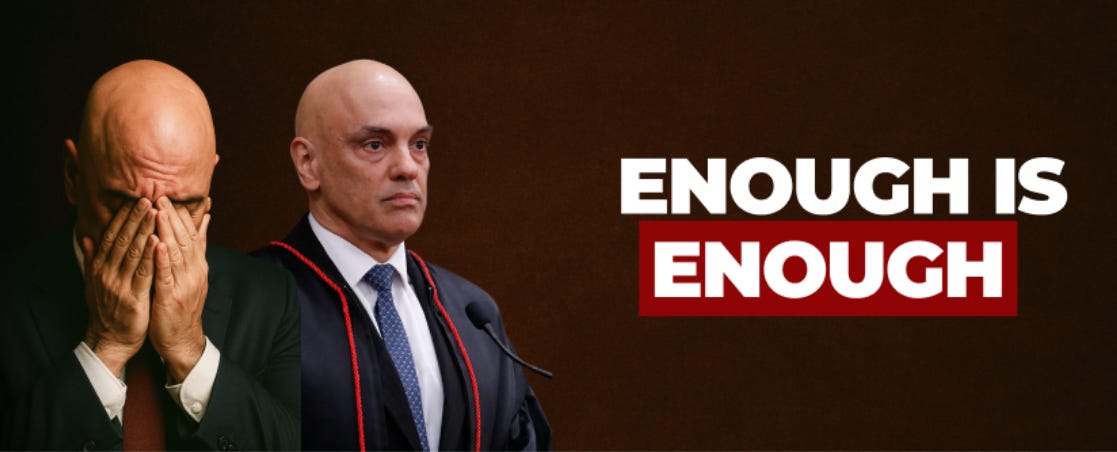UPDATE BRAZIL: How Did Moraes End Up With So Much Judicial Power?
UPDATED: a dossier has been added, available in English and Portuguese
img: Moraes flipping off the booing crowd at a soccer game. The photographer who captured this moment was fired the following day…
Video: At the moment when the court was ruling on the possibility of President Jair Bolsonaro (PL) broadcasting live election-related content from the Alvorada Palace, Moraes ran his index finger across his throat, in a gesture commonly used to refer to something that has come to an end — or a beheading. The GLOBO news agency found that Moraes, after giving the floor to Maria Claudia Bucchianeri, jokingly addressed an advisor who was in the TSE plenary. The reason, according to reports made to the newspaper, was the delay in passing on information (Riiiiight).
Alexandre de Moraes's significant judicial power in Brazil stems from
constitutional provisions that grant broad independence to the judiciary
his appointment to the Supreme Federal Court (STF)
presidency of the Superior Electoral Court (TSE)
his proactive stance in leading investigations against disinformation and perceived threats to democracy, particularly during a period of intense political polarization.
The Brazilian Constitution, since 1988, has provided the judiciary with financial, administrative, and operational autonomy, granting its members full independence to judge by the Constitution and law without external pressure.
Moraes has emphasized that no individual can overturn decisions made by the Supreme Federal Court (STF).
This constitutional framework allows for sweeping powers for Supreme Court justices, including the ability to make unilateral decisions, a power Moraes has frequently utilized.
Moraes was appointed to the STF in 2017 and has since become one of Brazil's most powerful individuals, holding immense authority through his oversight of extensive STF investigations.
He also served as the president of the Superior Electoral Court (TSE), a body responsible for organizing and certifying Brazilian elections, further consolidating his influence.
Moraes has wielded a rare combination of judicial powers by heading two sprawling investigations against groups spreading disinformation, often acting as both investigator and judge.
For instance, in 2019, Justice Dias Toffoli created the "Inquiry on Fake News" and assigned it to Moraes, who then began to act with broad authority, similar to a chief of police.
He has been crucial in addressing what he views as anti-democratic actions by former President Jair Bolsonaro and his supporters, particularly in the aftermath of the 2023 Brazilian Congress attack.
Moraes has ordered numerous controversial judicial actions, including preventive detentions, censorship of content, and blocking of social media profiles of individuals and groups suspected of involvement in coup planning and disinformation.
He has also ordered the suspension of Bolsonaro's social media accounts for spreading disinformation and has imposed house arrest on Bolsonaro for allegedly violating a Supreme Court censorship order.
His actions have led to accusations from the United States and some European parliamentarians of overstepping legal boundaries, engaging in human rights abuses, and undermining the separation of powers.
Despite these criticisms, Moraes maintains that he acts within the law to protect Brazilian democracy from harmful speech and attacks on the judicial system.
The problem is, there is NO democracy in Brazil, it is borderline tyranny, and Lula is pushing to have a Socialist government by next year’s election.
NOTE: In Brazil, if someone files a charge against you, you are automatically considered guilty. It is up to the person charged to prove his innocence. Needless to say, this has smoothed Moraes’s ego for even more power.
Moraes’ Dossier
Available in Portuguese as well as English, it provides the events that have led to Moraes’ power ride from 2019 to today.




